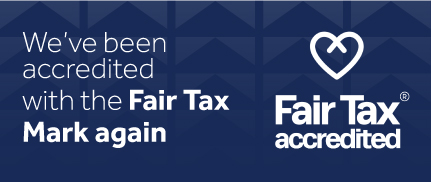Leeds Building Society Tax Strategy
Overview
At Leeds Building Society we recognise that tax pays for vital public services, which benefit our members, colleagues and communities, giving us the strong foundations we need to thrive as a business in the long term. That’s why we’re committed to paying our fair share and reporting our tax affairs transparently to our stakeholders.
It is our policy to comply with all applicable tax laws and regulations in the jurisdictions in which we operate. We have formally adopted HM Revenue and Customs’ (HMRC) Code of Practice on Taxation for Banks and aim to pay the right amount of tax, at the right time, in compliance with the spirit, as well as the letter, of the law.
Risk appetite
We have a very low appetite for tax risk. In particular, we have zero tolerance for non-compliance and we will not act with the intention of achieving a tax position that is contrary to the intentions of Parliament.
Management of tax risk
We employ and train relevant colleagues to an appropriate level of knowledge to ensure that tax related activities are conducted accurately and in a professional manner. Where we do not possess the appropriate level of expertise, we engage the services of external tax advisers. We also seek external advice for any transactions that could have a significant tax impact or where uncertainty as to the tax treatment exists.
We apply a three lines of defence model to manage the risk of tax related activities and ensure appropriate oversight and accurate determination and reporting of our tax position.
Our whistleblowing policy, ‘Speak Up’, sets out the standards we expect of colleagues and those who work with us. Our Speak Up arrangements can be used to raise concerns if colleagues have any suspicions or knowledge of wrongdoing or misconduct, including in relation to tax risk.
The Audit Committee is responsible for annual approval of the Tax Strategy and the Tax Risk Management Policy, which outlines how we approach the management of tax risk, on behalf of the Board (last approval September 2024).
Our Chief Financial Officer is the appointed director responsible for tax related matters on behalf of the Society.
Tax planning
We manage our tax arrangements in line with genuine commercial activity and do not undertake transactions solely for the purposes of avoiding tax. We will make use of tax reliefs to which we are entitled without taking an aggressive interpretation of the relevant legislation.
We do not maintain any connection to tax havens other than for legitimate trading activity with the purpose of serving the local community in that jurisdiction. We will not use tax havens to obtain any tax or financial secrecy benefits.
We will not use marketed or abusive tax avoidance schemes that are likely to fall foul of tax avoidance legislation in any jurisdiction in which we operate.
We seek to declare profits in the jurisdiction where their economic substance arises and report our tax position clearly in our Annual Report and Accounts.
Relationship with HMRC and other relevant tax authorities
The Society, with support from our advisers, maintains a professional and transparent relationship with HMRC and other relevant tax authorities. We will fully disclose significant uncertainties in relation to tax matters and seek to resolve issues before returns are filed wherever possible.
We will proactively engage with the relevant tax authorities in advance of undertaking any transaction where there is significant uncertainty as to whether the transaction is contrary to the intentions of Parliament.
[i] The three lines of defence model is standard practice in the financial services sector and comprises first line business management, external advisers (second line) and independent assurance from Internal Audit (third line) as necessary under a risk based approach.

